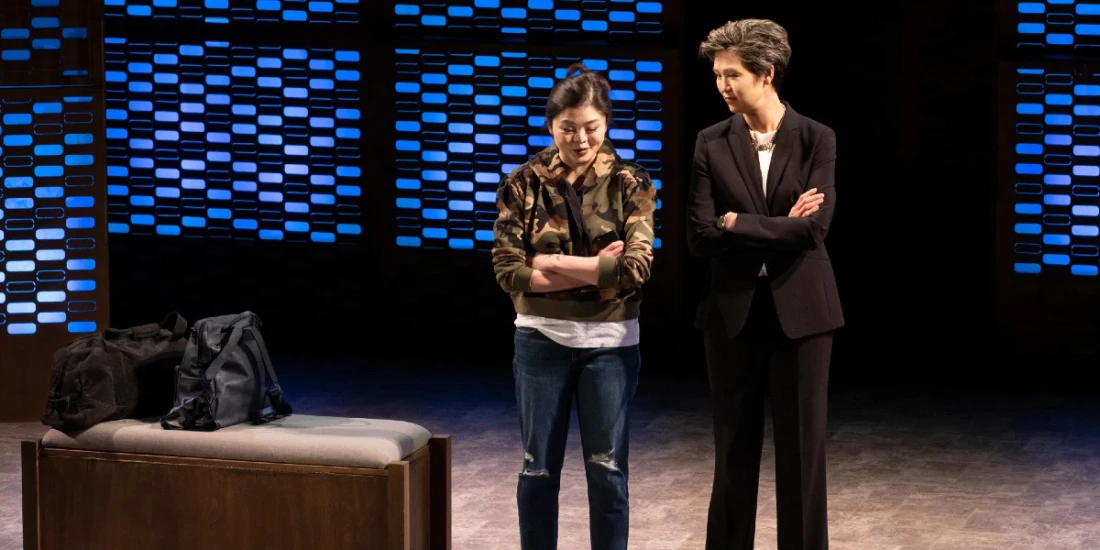'Golden Shield' review — compelling yet busy play gets lost in translation
In Act II of Golden Shield, the ambitious new drama by Anchuli Felicia King, the narrator takes us through the English proverb "too many cooks in the kitchen." What that proverb means, says the narrator (played with energetic charm by Fang Du), is "misguided benevolence. Too many people trying to help at once." It's a popular adage, and it can also be used to describe King's play: compelling but overstuffed with ideas.
Golden Shield is named after the firewall in China that enables the country to censor the internet, blocking its citizens from accessing sites such as Google and YouTube and enabling the government to crack down on dissident networks, which has led to human rights abuses. The play was also inspired by the real-life phenomenon of Chinese citizens suing American tech companies for their part in helping construct the Golden Shield (in real life, a lawsuit against Cisco was dismissed in American court). The play follows Julie (Cindy Cheung), a Chinese American lawyer, representing eight Chinese dissidents in suing ONYS Systems. But Julie does not speak Mandarin, so she hires her sister Eva (Ruibo Qian) to be her translator.
You would think Golden Shield would be a linear courtroom drama, but King structures her play atypically. It goes back and forth in time, from when the case is first being put together in 2012 to the trial in 2016. The play is staged in a sleek and stylish way by director May Adrales, where the time jumps are clearly rendered — furniture pieces smoothly slide in and out of the puzzle-box-like set by the scenic design collective dots (the walls are also an endless array of differently shaded dots, which brings to mind the zeros in binary code).
Golden Shield touches on a number of topical issues: how morality gives way to capitalism, censorship in the internet age, how America is culpable even as it criticizes China, and the deficiencies in human communication. The play also asks whether it's even possible to truly translate from one language to another, the nuances that get lost in translation, how language can be weaponized to misdirect or obfuscate, and whether it's truly possible to communicate with another person (even if you speak the same language).
That last point is particularly relevant to Julie and Eva, whose relationship is strained because they were both raised by a mother who was a "violently unstable petty tyrant. She is the source of Eva's suicidal ideation and dysmorphia, as well as Julie's overwhelming emotional paralysis." This piece of information is given by the narrator, on whom the play over-relies to comment upon the proceedings. The device is clever initially but becomes a cop-out as the play progresses, a way to tell the audience what is happening instead of showing them.
Unfortunately, Julie and Eva are much less interesting than the play's supporting characters, which includes a quietly affecting Michael C. Liu as a Chinese professor who is imprisoned and tortured for trying to find a way to bypass the Golden Shield, and Max Gordon Moore as the pompous and amoral ONYS president who places money above human rights.
That is because Julie and Eva's damage — trauma from abuse and an identity crisis of being Asian American in between two different cultures — is enough to power its own play. And as recent films like Everything Everywhere All At Once or Turning Red showcase, there's an ample well of storytelling in the fraught relationship between Asian women and their families. Unfortunately, the sisters' story is shoehorned inside of a play already filled to the brim with themes.
Even though the sisters are positioned as the lead characters, even on the show's posters, they are the most one-dimensional. Though Cheung and Qian valiantly try to round out their characters through body language, the script does not give them adequate motivation for why they're even taking on the case, putting them at an emotional remove from the central tension of the play. And the slip of the reason Golden Shield gives seems like self-hatred at being Asian, which, to its detriment, the play does not explore.
The trial and its buildup are the focus here, so much so that every time the narrative goes back to Julie and Eva having the same circuitous non-conversation about their family, it stops the play cold and robs it of energy. Their conflict seems merely a plot device to inject unnecessary drama into the proceedings, as if taking a foreign nation to court isn't interesting enough.
It's unfortunate because Golden Shield has the ingredients to be an important and prescient piece of theatre, and King is a formidable new voice to watch. After all, despite the seeming freedom of the internet, censorship and propaganda is proliferating — not just in China but in America as well. And from ethnic cleansing to hate crimes, there have been deadly consequences in both countries. Golden Shield touches on these issues without adequate space to substantively comment on them.
At the end of Golden Shield, there is a beautiful scene between Li Dao and his wife Huang Mei (Kristen Hung, who disappears into her two roles with skill). Not a single word is spoken, and yet you learn all you need to know about the characters and their relationship. There, you get a sense of what Golden Shield could have been, if only King had narrowed the focus of her play — not to a wide, sprawling network of loud voices drowning each other out, but to a quiet story about people trying to maintain their humanity in an increasingly dehumanizing, digital world.
Photo credit: Ruibo Qian and Cindy Cheung in Golden Shield. (Photo by Julieta Cervantes)
Originally published on
